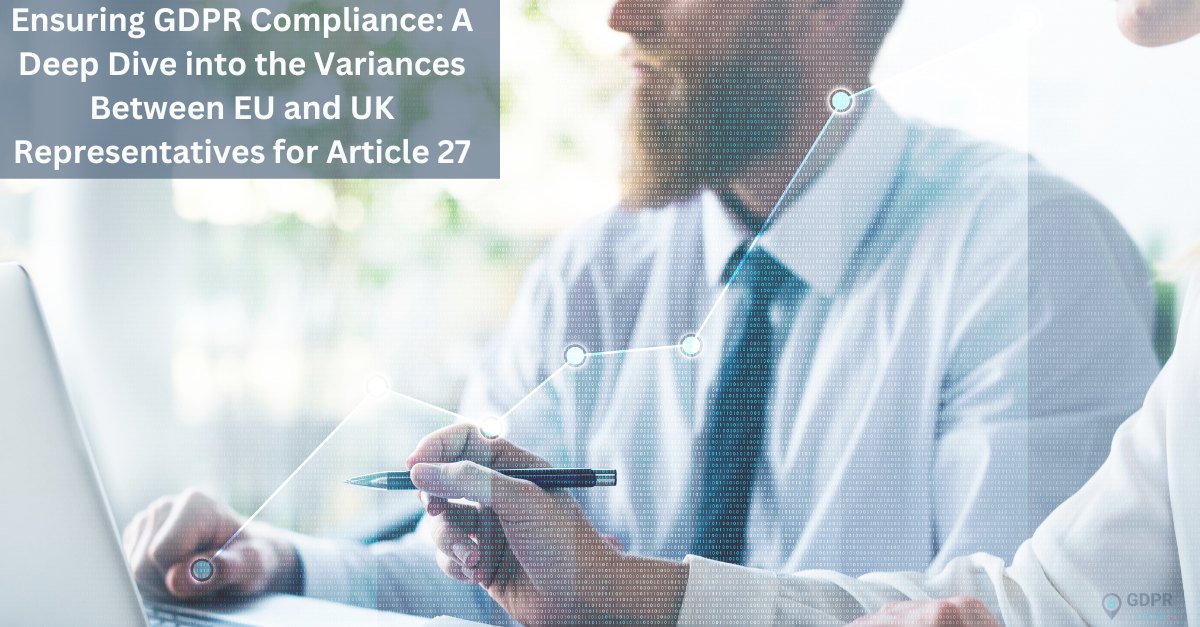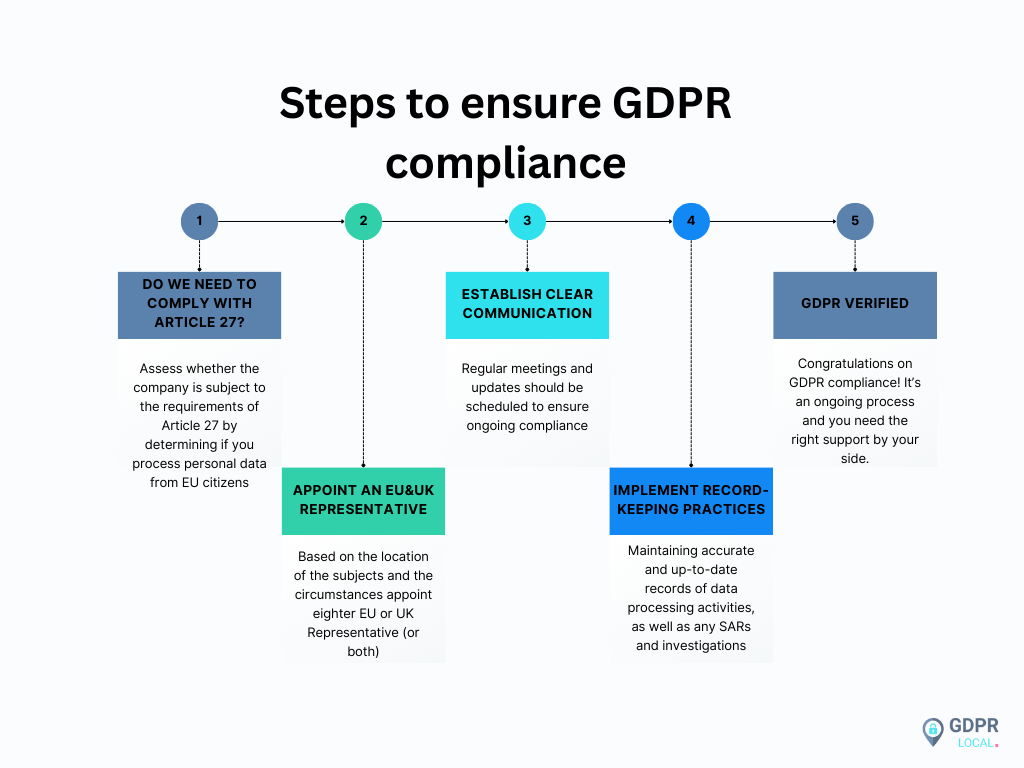
Ensuring GDPR Compliance: A Deep Dive into the Variances Between EU and UK Representatives for Article 27
The General Data Protection Regulation (GDPR) is a comprehensive data protection law that was introduced by the European Union (EU) in 2018. It aims to protect the privacy and personal data of individuals within the EU and governs the way organizations handle and process this data. One of the key provisions of the GDPR is Article 27, which requires organizations based outside the EU to appoint a representative who will act as a point of contact for data protection authorities and individuals within the EU and with that to have GDPR compliance measures in place.
Understanding the Role of EU Representatives under Article 27
Under Article 27 of the GDPR, organizations that are not established within the EU but process the personal data of individuals in the EU are required to appoint an EU representative.
The EU representative acts as a bridge between the organization and the EU data protection authorities, ensuring that the organization complies with the GDPR’s requirements. The representative must be located within one of the EU member states where the individuals whose data is being processed reside.
The EU representative has several key responsibilities, including acting as a point of contact for data protection authorities and individuals within the EU, maintaining records of data processing activities, and cooperating with data protection authorities during investigations or audits. They are also responsible for ensuring that the organization complies with the GDPR’s requirements, such as obtaining consent for data processing, implementing appropriate security measures, and responding to data subject rights requests.
Key Responsibilities and Requirements of EU Representatives
The EU representative plays a crucial role in ensuring GDPR compliance for organizations based outside the EU. They are responsible for maintaining records of data processing activities, which must include information such as the purposes of the processing, categories of data subjects, and the recipients of the data. These records must be available to data protection authorities upon request.
In addition to record-keeping, EU representatives must also cooperate with data protection authorities during investigations or audits. They must assist with any inquiries from data protection authorities and provide them with the necessary information to ensure compliance with the GDPR. EU representatives should also be knowledgeable about the GDPR and stay up to date with any changes or updates to the regulation.
Exploring the Role of UK Representatives under Article 27 post-Brexit
With the UK leaving the EU, there have been changes to the requirements for organizations UK based regarding Article 27. Prior to Brexit, organizations based in the UK could appoint an EU representative to fulfill their obligations under the GDPR. However, post-Brexit, UK organizations are no longer required to have an EU representative.
Instead, UK organizations that process the personal data of individuals in the EU are required to appoint a UK representative. The role of the UK representative is similar to that of the EU representative, acting as a point of contact for data protection authorities and individuals within the EU. The UK representative must be located within the UK and fulfill the obligations set out in the GDPR.
Similarities and Differences between EU and UK Representatives
While the roles of EU and UK representatives under Article 27 are similar, there are some key differences to consider. One of the main differences is the location requirement. EU representatives must be located within one of the EU member states where the individuals whose data is being processed reside. On the other hand, UK representatives must be located within the UK.
Another difference is the jurisdiction under which the representatives operate. EU representatives are subject to the jurisdiction of the EU data protection authorities and must comply with the GDPR. UK representatives, on the other hand, are subject to the jurisdiction of the UK data protection authorities and must comply with the UK’s data protection laws, which are aligned with the GDPR.
It is important for organizations to carefully consider these differences and select the appropriate representative based on their specific needs and circumstances. It’s important to take into account factors like the location of most data subjects and the organization’s business operations.
Challenges and Considerations when selecting an EU or UK Representative
Selecting the right EU or UK representative can pose some challenges for organizations. One of the main challenges is finding a representative who has the necessary expertise and understanding of the GDPR and data protection laws. The representative should be knowledgeable about the specific requirements and obligations under Article 27 and be able to effectively communicate with data protection authorities and individuals within the EU.
Another consideration is the cost associated with appointing a representative. Before deciding on an EU or UK representative, organizations should check out the costs, ongoing compliance expenses, and any extra resources they might need.
Additionally, organizations should consider the reputation and credibility of the representative they choose. The representative will be acting on behalf of the organization and will be the main point of contact for data protection authorities and individuals within the EU.
Steps to ensure GDPR compliance with Article 27
To ensure GDPR compliance with Article 27, organizations should follow a series of steps. First, they should assess whether they are subject to the requirements of Article 27 by determining if they process the personal data of individuals in the EU. If so, they should appoint either an EU or UK representative, depending on their specific circumstances and the location of their data subjects.
Once a representative has been appointed, organizations should establish clear communication and cooperation with the representative. Make it a point to have regular meetings and stay up-to-date with GDPR changes to keep things compliant, especially with any new rules or updates.
Organizations should also implement robust record-keeping practices to ensure that they can provide the necessary information to data protection authorities upon request. This includes maintaining accurate and up-to-date records of data processing activities, as well as any data subject rights requests or investigations.

Best practices for working with EU or UK Representatives
Working effectively with EU or UK representatives requires a proactive and collaborative approach. Organizations should establish clear lines of communication and maintain regular contact with their representative. This includes providing them with any necessary updates or changes to data processing activities, as well as addressing any concerns or inquiries they may have.
It is also important to provide the representative with the necessary resources and support to fulfill their obligations. This includes providing them with access to relevant data and information, as well as any training or guidance they may require.
Organizations should also regularly review and monitor the performance of their representative to ensure ongoing compliance with the GDPR. This includes conducting periodic audits or assessments to evaluate their effectiveness and adherence to the requirements of Article 27.
The importance of ongoing monitoring and review for GDPR compliance
Ensuring GDPR compliance is an ongoing process that requires regular monitoring and review. Organizations should establish a system for monitoring their data processing activities and reviewing their compliance with the GDPR.
This includes regularly reviewing and updating their records of data processing activities, as well as conducting internal audits or assessments to identify any areas of non-compliance or potential risks. Any identified issues should be addressed and resolved to ensure ongoing compliance.
Additionally, organizations should stay informed about any changes or updates to the GDPR and other relevant data protection laws. This includes monitoring regulatory updates and guidance from data protection authorities, as well as seeking legal advice or consulting with experts when necessary.
Conclusion: Navigating the complexities of Article 27 and ensuring compliance
By understanding the role of EU and UK representatives, as well as the key responsibilities and requirements, organizations can make informed decisions and take the necessary steps to comply with the GDPR.
Selecting the right representative and establishing effective communication and cooperation are essential for maintaining compliance. Ongoing monitoring and review, along with regular updates and training, will help organizations stay up to date with the GDPR and address any potential compliance issues.
By following best practices and staying proactive, organizations can navigate the variances between EU and UK representatives for Article 27 and ensure compliance with the GDPR’s requirements. By doing so, they protect the privacy and personal data of individuals within the EU and maintain trust with clients.
For more information about appointing an EU&UK Representative, make sure to write to us at [email protected].